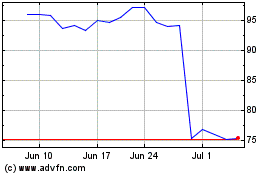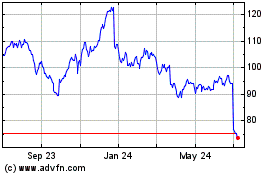By Khadeeja Safdar
This article is being republished as part of our daily
reproduction of WSJ.com articles that also appeared in the U.S.
print edition of The Wall Street Journal (September 17, 2018).
The Nike Inc. ad featuring NFL quarterback-turned-activist Colin
Kaepernick divided American shoe buyers, with some calling for a
boycott of the company and others vowing to buy more of its
sneakers.
Odds are the activism won't last.
Companies from Nordstrom Inc. to L.L. Bean have faced
controversies that prompted a segment of consumers to boycott or
stock up on their products. But research suggests the activism
fades quickly, and when it does shoppers tend to revert to their
previous behavior, leaving the companies no worse or better off
than before.
After Mr. Kaepernick's involvement in Nike's latest ad campaign
was revealed on Labor Day, investors sold shares, critics torched
their shoes and supporters raced to stores. The former Super Bowl
quarterback became a central figure in a political firestorm when
in 2016 he began kneeling on the field during the national anthem
to call attention to racial injustice. Some criticized his protest
as unpatriotic.
Kenyattia Hackworth, a 25-year-old track athlete in Mobile,
Ala., said she went to buy some Nike gear right after the ad was
unveiled and then made a second trip to a Nike store later in the
week with some friends, who also purchased clothes and sneakers.
"I'm going to wear Nike even more now," she said. "I want to show
my support."
For a few days, the ad generated more demand for Nike products
at Stadium Goods, which sells collectible sneakers through its
website and a store in New York, Chief Executive John McPheters
said. "The campaign resonated with a piece of our audience," he
said. "I wouldn't say it's made a massive difference, but there was
a little bit of an uptick in sales." Foot Locker said the response
from the shoe retailer's customers "has been largely positive."
Nike didn't respond to several requests for comment.
Data from a few days later show that the sales pop didn't last
long. Online sales jumped for two days, according to research firm
Edison Trends, which analyzed email receipts from 3 million users.
Sales rose 31% from Sunday through Tuesday, topping the 17%
increase in the same period a year earlier, but by the end of the
week they declined 18% compared with the peak on Tuesday, returning
to around the same level they were before the ad.
Similarly, calls for a boycott came quickly after the ad
appeared. Some people defaced their Nike gear. A few schools,
including College of the Ozarks and Truett McConnell University,
vowed to cut ties with Nike. President Trump wrote on Twitter,
"Just like the NFL, whose ratings have gone WAY DOWN, Nike is
getting absolutely killed with anger and boycotts. I wonder if they
had any idea that it would be this way?"
The reaction, however, cooled down a few days later. Mentions of
#NikeBoycott on Twitter and Instagram peaked one day after Labor
Day with a tally of more than 203,000 and then fell to less than
1,000 a week later, according to data from Brandwatch, a
social-media monitoring company. Nike shares, which had fallen
about 3% the day after the ad was first revealed, recovered all
their losses and Thursday hit an all-time intraday high of
$83.90.
Boycotts generate buzz and can sometimes cause companies to make
concessions if the negative attention poses a reputational risk,
but there is little evidence to suggest that they have a meaningful
impact on sales, said Brayden King, a Northwestern University
professor of management who studied the impact of more than 140
boycotts from 1990 to 2005.
"Consumers aren't as consistent with their behaviors and beliefs
as we think," he said. "People who say they've boycotted a product
might not be in the market for buying that product anyway."
Last year, shoppers promised to boycott L.L. Bean after the
company's heiress Linda Bean was revealed to be a Trump donor. The
same year, supporters of Mr. Trump called for a boycott of
Nordstrom after the department store dropped Ivanka Trump's fashion
line. Nordstrom has had three consecutive quarters of comparable
sales growth. L.L. Bean doesn't report sales figures as it is
privately held.
Nike has a history of making ads that court controversy,
including one in 1995 that featured an openly gay, HIV-positive
runner.
In recent years, Nike has been battling with Adidas AG and Under
Armour Inc. for the attention of young shoppers, who tend to be
more aligned with Mr. Kaepernick's cause. In total, 44% of U.S.
adults who have bought Nike apparel or sneakers in the past three
months fall between the ages of 18 and 34, according to YouGov. The
survey firm's research shows that recent Nike customers are also
more ethnically diverse than the country's population at large.
By featuring Mr. Kaepernick, Nike is making a long-term
investment in its brand, said Dave Cory, co-founder of footwear
brand Obra and formerly a product director at Nike brand
Converse.
"Adidas had been eating Nike's lunch," he said. "Even if the
young kids aren't actively in the market for a pair of sneakers,
Nike is back on their minds."
Greg James, a 31-year-old entrepreneur in Newport, R.I., said he
replaced his boat shoes with his first pair of Nike sneakers this
week. "If they're not going to get support from one side, they
should get it from the other side," he said, though he said he
would continue buying Nike products only if his new shoes perform
well.
Write to Khadeeja Safdar at khadeeja.safdar@wsj.com
(END) Dow Jones Newswires
September 17, 2018 02:47 ET (06:47 GMT)
Copyright (c) 2018 Dow Jones & Company, Inc.
Nike (NYSE:NKE)
Historical Stock Chart
From Mar 2024 to Apr 2024

Nike (NYSE:NKE)
Historical Stock Chart
From Apr 2023 to Apr 2024
